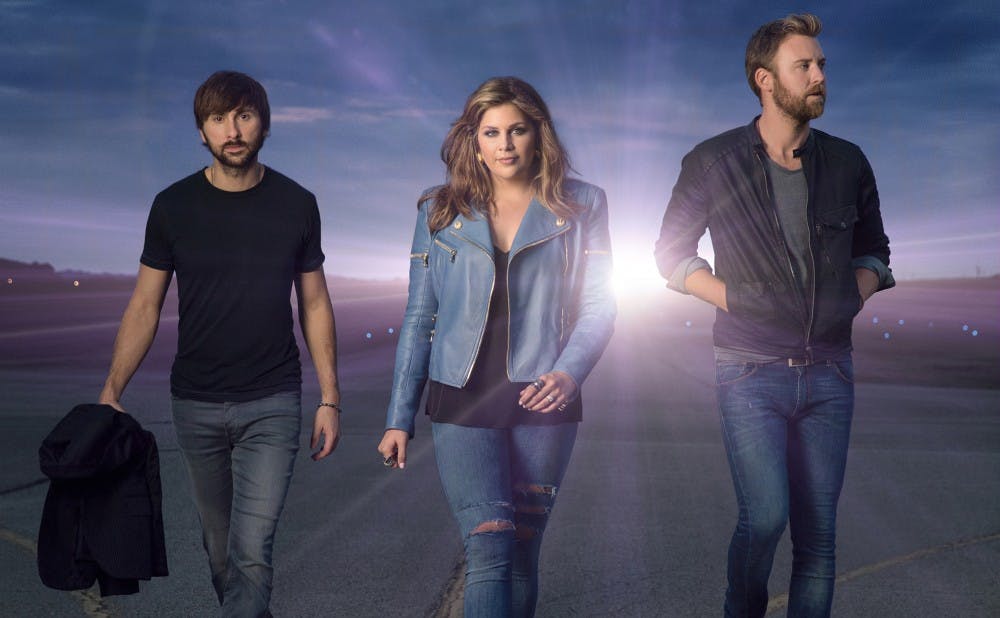It’s been a big week in country music. Lady Antebellum’s new album, 747, is a testament to their lyrically-driven, ballad-tinged country. For the seemingly precious-few country listeners out there, Lady Antebellum has been a staple songwriting tour de force in country music since their entrance onto the country music stage in 2007. Although the majority of the album's tracks stay within the safety of the status quo, 747 has some radio favorites (“Bartender,” in particular, has already hit country charts) and genuinely well-written songs (“Long Stretch of Love” and “Down South”).
Meanwhile, the square-jawed Blake Shelton delivers yet again in his quintessentially-country album Bringing Back the Sunshine, with particularly strong hits in “Good Country Song,” chart-topping “Neon Light” and the beautifully whimsical “South of Heaven.” Yet the little fanfare that accompanied the new releases of these two country giants begs the question: is country music a serious music genre which deserves our critical attention?
My own venture into country began by riding the tail end of a millennial-driven folk and bluegrass revival. Before long, I was listening to some hardcore bluegrass. While my peers teeny-bopped to Rihanna and Maroon 5, there I was with my raggedy headphones, intently listening to my crackly, newly digitally-mastered recordings of itinerant bluegrass musicians from the 1940s in western North Carolina. It was a lonely experience because very few people I knew–and even fewer my age–were bluegrass purists. Weak as I was then in my musical convictions, I threw in the towel. I went backwards on the folk spectrum until finally, I arrived at our genre in question: popular country music.
"Don’t you find country idiotically simplistic, formulaic even?" my friends ask me. Yes, I have to admit–like in any musical genre–there are some songs which make it past the industry gatekeepers and shock us with their lyrical superficiality (see Luke Bryan’s “Rain is a Good Thing”) and grammatical incoherence (Chase Rice’s “Gonna Wanna Tonight” is a prime example). But underneath popular country music’s predictable invocations of ice-cold beer, pick-up trucks and daisy dukes is what I believe to be a genuinely meaningful, culturally complex genre of music worth listening to.
At the center of my peers’ dislike for (radio) country music is, I believe, an instinctual distaste for the genre’s socio-cultural associations: its symbols of meaning, its blue collar audience and, ultimately, the false utopia it draws on for relevance. I say utopia because the bucolic–family values, tailgates, heavy drinking, romanticization of the agricultural cycle–rely on a beautified vision of pastoral paradise. My own hypothesis is that in technocratic, globalized cultures like ours today, anything that bills itself as authentic will gain social traction. But I also say “false” because this nostalgia is for something that has never existed, at least not on a large-scale. By any historian’s account, America’s agrarian past was full of physical hardship and bigotry of all kinds. For every utopia that has existed in the present to theorize the future, there has been a corresponding effort to airbrush the past.
Yet the falsity of country’s utopia does not invalidate its cultural worth. Indian psychologist and theorist Ashis Nandy wrote about false utopias as important boundaries for our mappings of reality: “Self-consciously or not, we are often in dialogue with utopias which define, or once define, our own utopias as a starting point or as a target of defiance.” All utopias are false anyways: country music offers a potent visual language of sunshine, freedom and porches which draws out the common humanity. Its articulation of working-class values speaks to the relationship which appoints country music as an important conduit and historical artifact for understanding the mosaic of American culture. Blake Shelton’s track off his new album, “Buzzin,’” epitomizes this working class sensibility. It is the same kind of class-based ideology that makes Fox News possible and, yet, also inspires small acts of kindness and hospitality which keep my faith in humanity alive. Heck, it also doesn’t hurt that country music is a good time.
Of course, we cannot take country and its version of Real America at wholesale, at face value; country music’s value in producing and edifying community through nostalgia also reinforces race, gender and class xenophobias (think the Islamaphobic "redneck"). Because of this, I love country music in much the same way that I love Lana del Rey, the cultural icon, and hate Lana, the anti-feminist. But if we can be aware of the limitations of country music while embracing its unabashed value for human relationships, then I say country music has something to offer everyone. Am I being selective? Yes, of course. But no song is perfect.
So, lay down your pretension and disdain for that which is foreign. Embrace what is universal–love of family, belonging, and freedom–no matter how it is expressed. Screw irony. Screw cynicism. Sometimes what is good doesn’t have to be complex or overwrought. As long as it’s genuine and makes me smile, then I’m going to, in the words of Randy Houser, put my hair down and get some of that laid on back.
Get The Chronicle straight to your inbox
Signup for our weekly newsletter. Cancel at any time.

